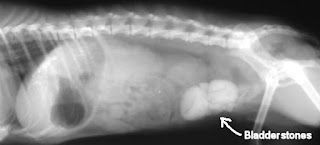Bladder Stone / Slude ( Calculi )
 |
| Bladder Stone in Rabbit |
Bladder or calcium stone and / or sludge can occur when a rabbit does not process calcium through the kidneys, which is ...
Descripton
The presence of calcium in the diet of rabbits is important because too little can cause tooth and bone problems. On the flipside, too much can cause a build up of calcium in the urinary tract and kidneys, which can then be formed into a bladder stone (or stones of calcium). Or, maybe not form stones but is present as calcium clogging the kidneys and bladder, the bladder, known as sludge.
Rabbit urine is usually slightly overcast and it is caused by calcium present in urine. There is nothing inherent in regulating physiological rabbit calcium intake; Therefore, the rabbit may often take advantage of calcium and produce through his urine. Diet alone does not cause bladder stones / sludge - some rabbits seem to tend to while in others it may be triggered by the following factors:
- Rabbits do not drink enough
- Rabbit not enough exercise
- Filthy living conditions
- Diseases of the kidneys or bladder
- A diet high in calcium
Bladder stones or sludge can be diagnosed by physical examination, urine analysis or X-rays.
Symptom
- Rabbits more frequent urination / in unusual places
- Rabbit trying to urinate
- Blood in the urine
- Urine is too pale, white and dirty, probably mud in the vicinity of the tail
- Fatigue, depression
- Loss of appetite
- Stone bladder may, on rare occasions, passed by the rabbits and found in the waste tray
Prevention / Treatment
Bladder stone treatment may involve surgery if the stone is not passable and block the urethra. For small stones and mud, treatments may include hydration (by droplets or by encouraging rabbits drinking), flushing of the bladder, pain relievers and antibiotics.
Treatment and, more importantly, prevention can also include dietary changes. Alfalfa hay, if fed, should be removed from the diet and had to switch from a mixture of rabbit pellet food, if applicable. Too little calcium can be as dangerous as too much, dark green vegetables, which is a natural source of calcium still have to eat.
